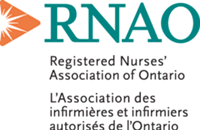RNAO applauds government for delivering on promise to look at NP compensation, says more needs to be done to stop RN replacement
TORONTO, Feb. 25, 2016 /CNW/ - The government's commitment to better compensate nurse practitioners (NP) who work in primary care will improve access for Ontarians by helping to stem the flow of NPs who have been leaving this sector.
Finance Minister Charles Sousa announced the measure Thursday during the release of Ontario`s annual budget. The province is investing 85 million dollars over three years for NP recruitment and retention in primary care settings, including those in northern and rural communities.
It's a move members of the Registered Nurses' Association of Ontario (RNAO) have been forcefully calling for. "NPs haven't had a pay increase in nine years, causing inequities with their counterparts in other sectors," says RNAO President Vanessa Burkoski. The wage gap caused a ripple effect throughout the primary care sector. "One in five NP positions in this sector is currently vacant. This limits access for the public and causes retention and recruitment challenges for organizations. It is an important step to improve access and will ensure people can continue to rely on the expertise of NPs for their primary care health needs," says Burkoski.
Hospitals will receive 345 million dollars more, including the first increase to their base budgets in five years. RNAO, which has been raising the alarm on the replacement of RNs for years, demands that conditions be attached to this money to hire full-time RNs and stop the dangerous trend of RN replacement. "More than 1,000 RN positions have been cut across the province during the last year alone as hospitals have been replacing RNs with less qualified health-care workers," says RNAO`s CEO Doris Grinspun, adding that "you can't claim to put patients first and then fail to ensure you have the right care provider caring for patients with complex needs. The evidence is conclusive that hospitals with higher proportions of RNs have lower mortality rates, lower rates of complications, fewer re-admissions, and lower costs."
The budget reiterated the government`s promise to expand the scope of practice of RNs to include prescribing but stopped short of outlining the best model to achieve this. "Other jurisdictions such as the United Kingdom have been doing this for 17 years," says Grinspun. The most effective way to improve access right away is to adopt independent RN prescribing.
Other health measures such as increased funding ($75 million) for palliative care, money earmarked for residents of long-term care homes with dementia and other behavioural needs, additional funding for Aboriginal Health Access Centres, and the move to make the shingles vaccine free for seniors are welcome news say nurses.
The province's plan to make alcohol more widely available at grocery stores received a thumbs-down from RNAO. RNs, NPs, and nursing students know that the move to put convenience ahead of science is especially troubling given a recent report by Canada's Chief Public Health Officer, which cites the damaging health effects of even one drink per day. RNAO says people need to remember that alcohol is a drug. Decisions to put beer and wine in grocery stores should be shelved until a comprehensive provincial alcohol policy is completed.
The budget included modest investments to help the government deliver on its promise to end homelessness within 10 years. While the 178 million dollars in new funding is welcome, RNAO says if the province earmarked one per cent of its budget for affordable housing, it could build new units and repair existing units faster. "The goodwill is there but it is not enough to end this problem," says Burkoski, adding that targets and timelines are needed if the government is serious about making life better for the 1.57 million people in Ontario who live in poverty.
A substantial increase in the minimum wage to $14 per hour is imperative to help the working poor. "You can't expect people to make ends meet on $11.25 per hour, which is what they earn today," says Burkoski. RNAO says social assistance rates also need to reflect the cost of living and the modest increase announced today for those on Ontario Works is welcome and opens the door for greater political will to tackle the desperate need. Without movement in these key areas, the government will end up paying more for health care because there is a direct relationship between poverty and ill health.
RNAO praised the government for taking important steps to protect people's health by promoting energy conservation, renewable energy options and reducing carbon emissions with its cap-and-trade plan. However, to be fair, Grinspun says the government needs to make sure it doesn't let industrial polluters off the hook by granting free emission permits. "Companies that produce emissions have to take responsibility for the harm they are causing to our environment, and they must pay," says Grinspun, arguing that a better option is to auction off all permits rather than giving them away for free to manufacturers.
The budget was released on the same day 175 registered nurses, nurse practitioners and nursing students assembled at the legislature for RNAO`s annual Queen's Park Day. Nurses met with more than 50 MPPs during breakfast meetings, attended Question Period and listened to speeches from representatives of the three parties during an afternoon question and answer session.
RNAO is the professional association representing registered nurses, nurse practitioners, and nursing students in Ontario. Since 1925, RNAO has advocated for healthy public policy, promoted excellence in nursing practice, increased nurses' contribution to shaping the health-care system, and influenced decisions that affect nurses and the public they serve. For more information about RNAO, visit our website at RNAO.ca or follow us on Facebook and Twitter.
SOURCE Registered Nurses' Association of Ontario

please contact: Marion Zych, Director of Communications, RNAO, Cell: 647-406-5605 / Phone: 416-408-5605, [email protected]

Share this article